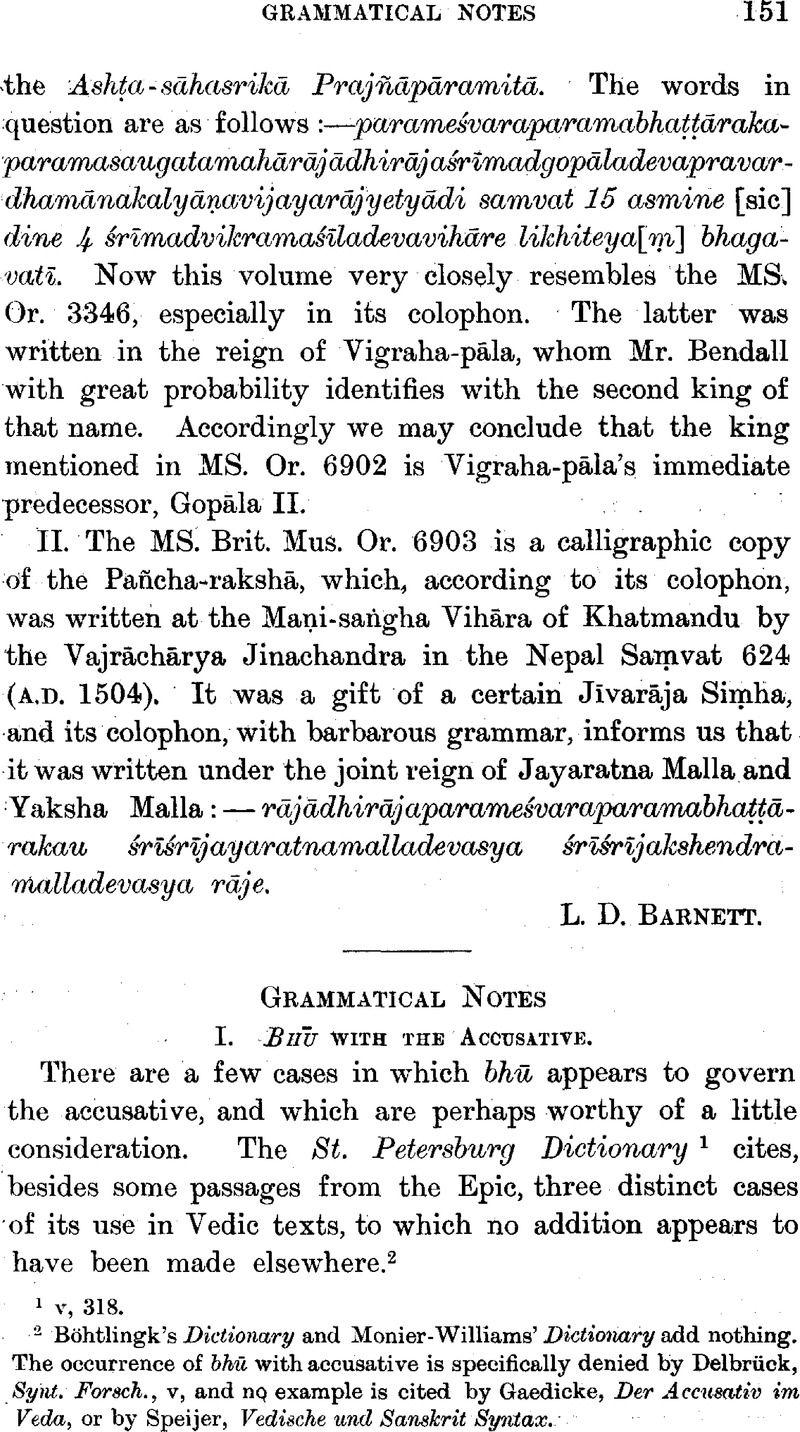No CrossRef data available.
Article contents
Abstract

- Type
- Miscellaneous Communications
- Information
- Copyright
- Copyright © The Royal Asiatic Society 1910
References
1 v, 318.
page 151 note 2 Böhtlingk's Dictionary and Monier-Williams' Dictionary add nothing. The occurrence of bhū with accusative is specifically denied by Delbrück, Synt. Forsch., v, and no, example is cited by Gaedicke, Der Accusativ im Veda, or by Speijer, Vedische und Sanskrit Syntax.
page 152 note 1 Cf. Böhtlingk, , Dictionary, iv, 272Google Scholar; Holtzmann, , Grammatitches aus dem Mahābhārata, pp. 46, 47Google Scholar.
page 152 note 2 See Whitney, , Sanskrit Grammar 2, § 1073Google Scholar. The example from the Aitareya Brākmana, vii, 17, occurs in the later portion of that work, and, even assuming that it is genuine, no conclusion can be drawn as to the lateness of the Aitareya as a whole. Moreover, a sporadic case is no good proof of date, as the linguistic possibility of such a case is always present; cf. Whitney, JAOS., xi, p. cxlviiGoogle Scholar; Liebich, , Pāṇini, pp. 80, 81Google Scholar.
page 152 note 3 See Whitney, , AJP., xiv, 184Google Scholar; Böhtlingk, , Sächs. Ber., 1893, pp. 7–9Google Scholar; Gurupūjākaumudī, pp. 18 seq.
page 153 note 1 Vergl. Synt., i, 370–2.
page 153 note 2 A good example is Maitrāyaṇṃī Saṃhitā, ii, 4, 8; cf. Tāṇḍya Mahābrāhmaṇa, xx, 14, 5.
page 153 note 3 v, 332.
page 153 note 4 La doctrine, du sacrifice, p. 23.
page 153 note 5 Delbrück and Speijer ignore the usage, it seems. Cf. cases in Latin like Corioli oppidum captum, Livy, ii, 33, 9.
page 154 note 1 There seems no need to alter the accent as suggested by Aristarchos' reading. The word is concrete here and not abstract (cf. Leaf, ad loc., with Monro, Homeric Grammar 2, p. 105). So in Iliad, iv, 242, we have ⋯λέϒχεα, “ye reproaches”! And ef. Śatapatha Brāhmaṇa, iii, 1, 3, 7: árur vái puruṣaḥ, “the man is a wound” Wackernägel, Altindische Grammatik, ii, 1, p. 5.
page 154 note 2 Delbrück, , Synt. Forsch., v, 215, 216Google Scholar, stated that the use could only be found in the Śatapatha Brāhmana, from which instances were cited by the St. Petersburg Dictionary. Caland, , Ueber das rituelle Sūtra des Baudhāyana, p. 46Google Scholar, adds examples from that Śrauta Sūtra, and reiterates Delbrūrck's assertion. But see my Aitareya Āranyaka, p. 246, and for a similar development in Early English, Kellner, , English Syntax, pp. 68 seqGoogle Scholar.
page 154 note 3 See a list in the St. Petersburg Dictionary, vii, 452.
page 155 note 1 Der Accusativ im Veda, p. 94.
page 155 note 2 St. Petersburg Dictionary, v, 338.
page 155 note 3 Greek Epic of India, p. 473; cf. JAOS., xxviii, 286.
page 155 note 4 Cf. my SŚṅkhāyana Āranyaka, p. xiv, and the absurd upanisasasāda in Aitareya Āranyaka, ii, 2, 3; Müller, Max, S.B.E., i, p. lxxxiiGoogle Scholar.
page 155 note 5 Op. cit., p. 265.
page 155 note 6 On Paṇini, vi, 3, 73, see Aufrecht, , JRAS., 1906, p. 993Google Scholar. The Epic passage remains, so far as I know, the earliest certain example in Sanskrit. The passages from the Vedānta referred to by Franke, ZDMG., xlviii, 84, are disposed of by Thibaut, ibid., 540. The Pāli and Prākrit passages are all late, and some doubtful.
page 155 note 7 Weber's ed., pp. 2 seq.
page 156 note 1 Monro, , Homeric Grammar 2, p. 245Google Scholar.
page 156 note 2 Ludwig takes the mother as Indra's mother; the natural sense is Vrtra's mother. Cf. Oldenberg, , Ṛgveda, p. 211Google Scholar.
page 156 note 3 So Whitney, , Sanskrit Grammar, p. 339Google Scholar; cf. Delbrück, , Synt. Forsch., v, 365–7Google Scholar. If this theory of the origin of the conditional were correct, it would be very strange that there should be such a very limited use of the form in that sense.
page 157 note 1 So emended by Whitney and Delbrück from ārkṣyāmahā of von Schroeder's text.
page 157 note 2 Delbrück, , op. cit., pp. 290 seqGoogle Scholar.
page 157 note 3 Vedische und Sanskrit Syntax, p. 60.
page 158 note 1 ZDMG., xli, 187.
page 158 note 2 Indeed, Whitney, , op. cit., p. 339Google Scholar, cites the passage in this sense from the Gopatha Brāhmaṇa.
page 158 note 3 Cited by Whitney, loc. cit.
page 158 note 4 Cf. Holtzmann, , Grammatigches aus dem Mahābhārata, pp. 36, 37Google Scholar; Böhtlingk, , ZDMG., xli, 187Google Scholar.
page 158 note 5 Cf. Manu, vii, 20 (Böhtlingk, , Sächs. Bar., 1896, p. 250)Google Scholar, yadi na pranayed rājā daṇḍaṃ daṇḍyeṣv atandritaḥ/ṡüle matsyam ivāpaksyan durbalaṃ balavattarāḥ (so Medhātithi and Govindarāja, with the v.l. ivāhiṃsyuḥ), where the condition is possible.
page 159 note 1 See references in my Aitareya Araṇyaka, pp. 245, 246.
page 159 note 2 See Miehelson, , JAOS., xxv, 135, 142Google Scholar.


